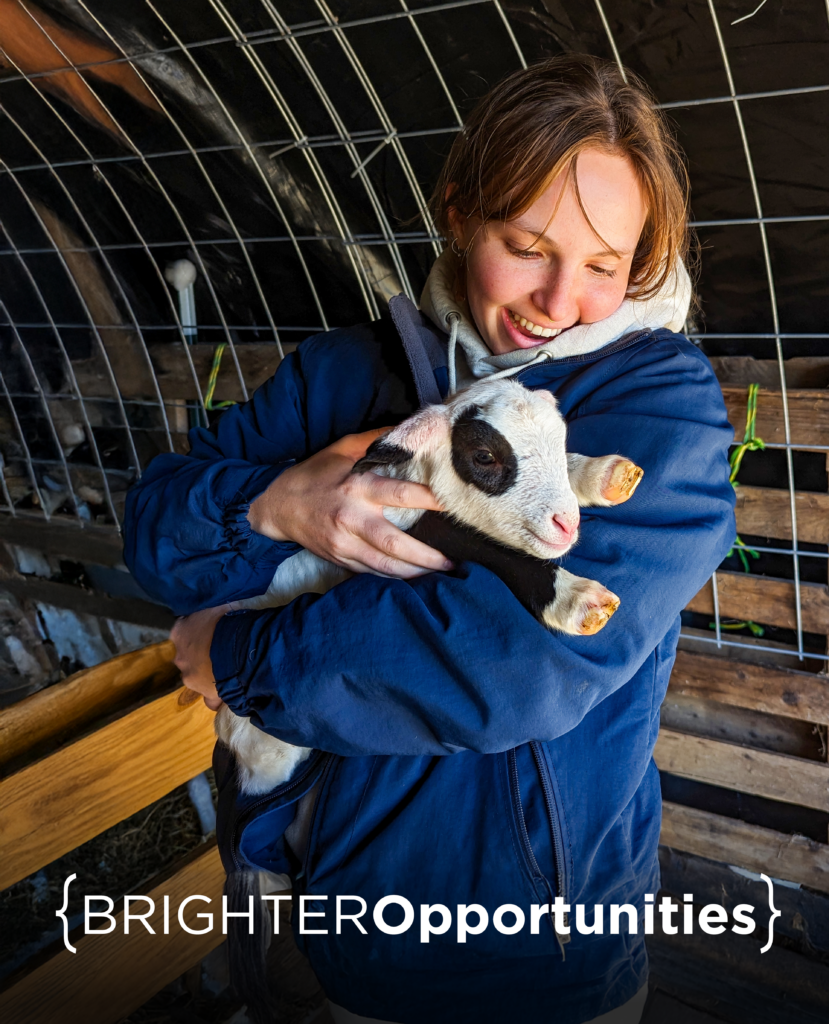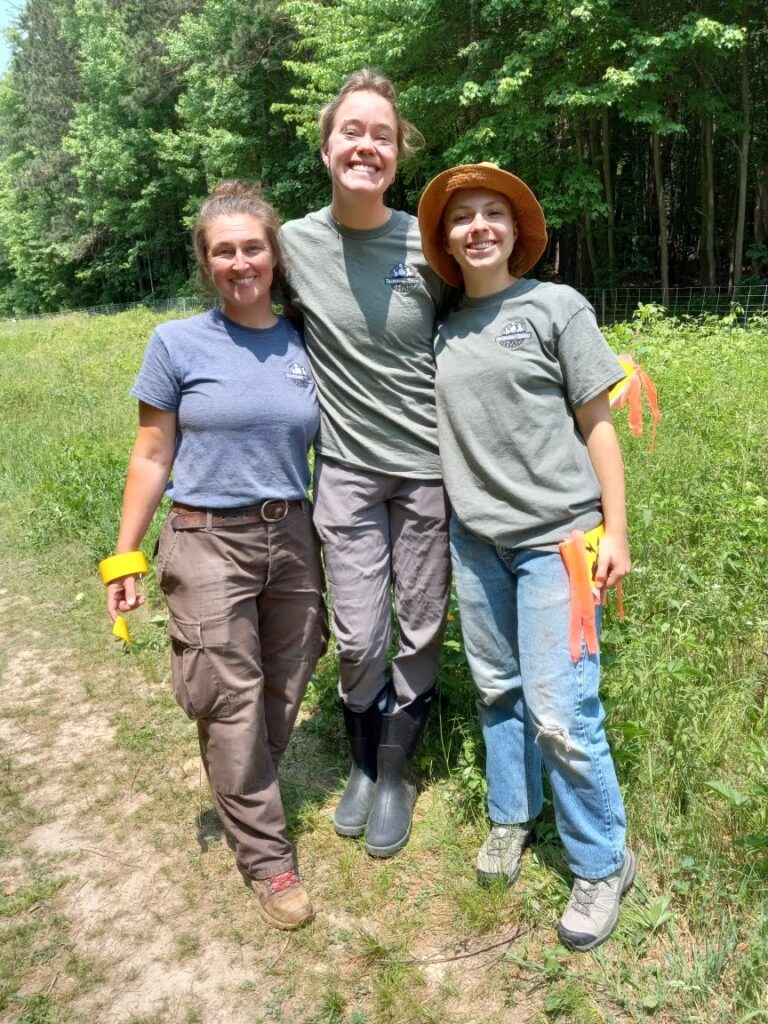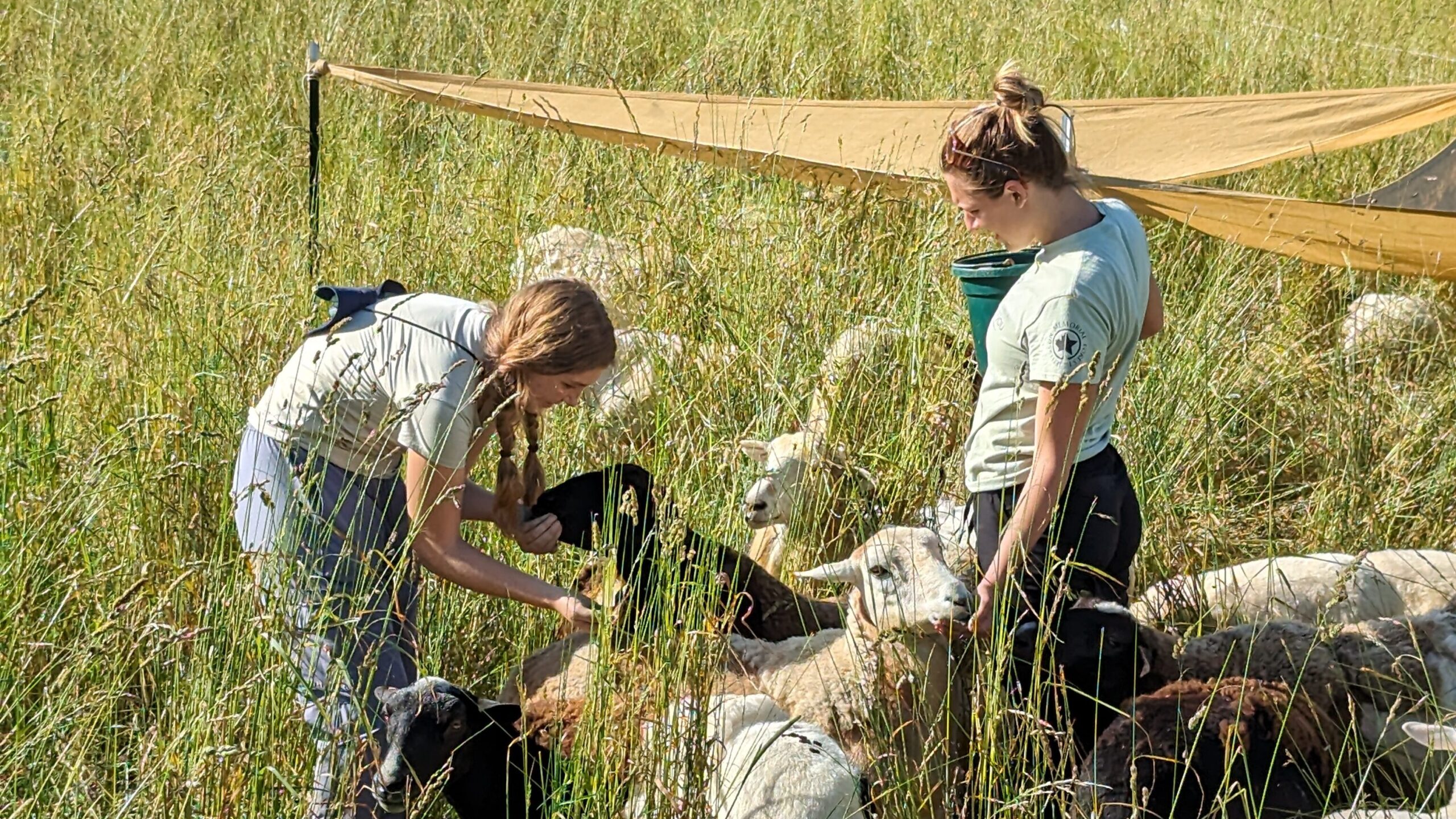Gifts to the Larry J. Bell ’80 Environmental Stewardship Center have assured its future and cleared a path beyond K for Ava Loncharte ’25

Launched in 2019 with a grant from the Arthur Vining Davis Foundation, The Larry J. Bell ’80 Environmental Stewardship Center (ESC) enriches the student experience and supports K faculty and staff by bringing together all things sustainability—from research and courses to extracurriculars and career exploration. The Center serves as a hub for programs and resources such as the Lillian Anderson Arboretum, Hoop House garden, Sustainability SIP Symposium, Environmental Conservation Organization, and student internships.
“It’s a place to be involved in meaningful work around sustainability and environmental issues that a lot of our students are really concerned about, where they can satisfy or expand that passion,” said Binney Girdler, professor of biology and director of the environmental studies program.
Since its founding, the ESC has coordinated funding from multiple sources to keep things running. While the Arboretum receives funds from the College’s operational budget, the ESC itself does not, instead relying on grants as well as gifts from alumni and friends of the College, including many given as part of the Brighter Light Campaign.
“There’s no one big organization that’s going to fund all these experiences,” Girdler said. “You have to cobble together a little grant here, a little something there, some small and medium donations, and it’s not easy. That’s another reason the ESC is so important to support and enhance K, because it’s a centralized place where we can bring together interest, funding, opportunities and mentors.”
In 2022, part of a $5.25 million gift to the Brighter Light Campaign from Larry Bell ’80 established endowed funds for the ESC. Thanks to that endowment, Sara Stockwood has been able to expand her work as ESC and Arboretum director from a 75% position to full time, as well as add a part-time coordinator (a position shared with Outdoor Programs).
“The gift ensures that the Center’s funding for staff salaries and benefits is more reliable,” Stockwood said. “It ensures that there will be funds for the future, funds forever, which makes the Center more stable.”
With that certainty and stronger staffing, Stockwood can focus more than ever on coordinating grants and other gifts to enable events, programs and internships.
Among the brighter opportunities made possible through gifts to the ESC, internships with local contract sheep grazing business Tending Tilth stand as a shining example. Lauren Burns, owner of Tending Tilth, needed help caring for and moving her sheep over the summer, and she wanted to provide the kind of hands-on learning she wished had been available when she was earning a biology degree at Western Michigan University.

Around the same time, Doug Doetsch ’79 and his wife, Susan Manning, were establishing a current-use gift through the Campaign, the Seminary Hill Sustainability Internship, to fund internships focused on sustainable agriculture or architecture.
After Girdler invited students with an environmental studies concentration to visit the farm and meet Burns as well as the sheep, Ava Loncharte ’25 applied for the Seminary Hill funding to intern with Tending Tilth for summer 2023.
“Logistically, working with that gift has been very simple,” Stockwood said. “The Tending Tilth internship fits very well with what (the donors) were looking for. I think the experience has been impactful for the students, and something they would not have come across in their normal studies at K, but which has a lot of connections to the things they are studying.”
A biology major with an environmental studies concentration, Loncharte found her social and academic community at K through the Hoop House and the Just Food Collective, and she was hooked from that first visit to the farm.
As Burns took the students around the farm on a cold, muddy March day, they came across a sheep who had just given birth. Burns asked who would like to help carry the newborn lambs into the shelter.
“I didn’t want to step on toes; I was sure everyone would want to,” Loncharte said. “I waited a minute, and nobody volunteered, and I was like, ‘I really, really want to hold that lamb.’ So, I got to hold this baby, baby lamb, and it was hands on and outside and dirty and super cool, and that was the moment I knew I wanted that internship. Later, Lauren told me that was also the moment when she was like, ‘That’s the intern I want.’”
Along with another K intern, Loncharte spent the summer setting up, taking down and moving fencing; helping sheep on and off the trailer; performing health checks on the animals; spending time with the sheep and supplying them with water; and interacting with curious observers when the sheep grazed in public areas. Burns also introduced her to concepts, experiences and professionals in many fields that touch contract grazing: agriculture, animal care, the fiber industry, beekeeping, hydrogeology, forestry, entrepreneurship and business. Loncharte appreciated the real-world workplace balance of science, business, interpersonal relationships and specific job skills.
“I know the students I work with are not all going to be tending sheep after this, but I really enjoy the mentorship aspect, and I want them to get experience in a lot of different areas,” Burns said. “They ask great questions, and they make me think about my business and what I want out of it as well. It’s been wonderful working with them. I appreciate their hard work in all weather and their willingness to learn.”
The Seminary Hill Sustainability Internship gift made this experience possible for Burns, who values the students’ contributions yet would struggle to pay them fairly for their work at her small operation, as well as for Loncharte and other students who crave this type of experience yet need to earn money over the summer.

The internship taught Loncharte about the science and business aspects of agriculture, food systems, regenerative soil practices, data collection and observation plant identification, and more.
“K being such a small school, we’re not always able to offer specific coursework in something like grazing and soil science,” Loncharte said. “I can’t get a degree from K in sustainable agriculture. What K does really well, though, is fund experiences that allow students to do so many diverse things that interest them. This internship helped me get the experience I wanted, and to have that as part of my K-Plan has allowed me to spread my wings so much more.”
Loncharte returned to Tending Tilth for a second summer internship in 2024, funded this time by the biology department and encompassing her Senior Integrated Project. Her internships helped her define the path she envisions herself taking after K.
“I would like to make my career around land stewardship, land management,” Loncharte said. “While being a mobile grazer is one way to do that, we talked about other ways that happens, too, and I met a lot of people who work on how to best steward the land. It’s a complicated question, and there isn’t an exact right answer, but what I’ve taken away the most is that I want to participate in that work. This internship has given me a sense of purpose and a passion I can use to guide the decisions I make, and the confidence that comes along with that.”
